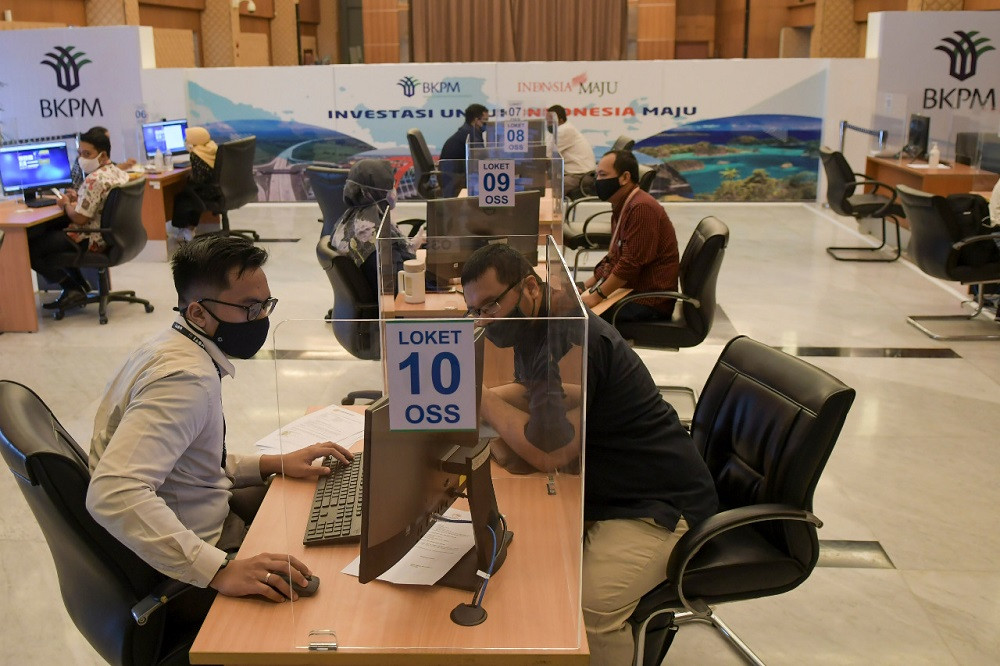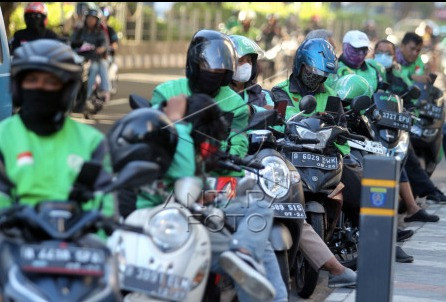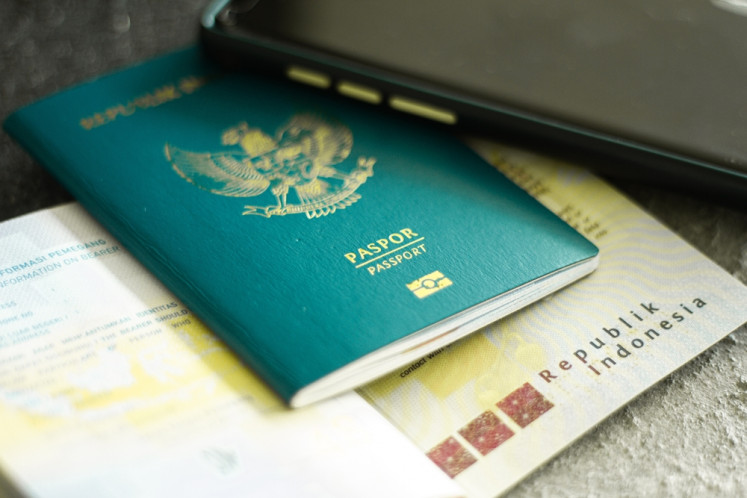Further steps needed to improve business ecosystem in Indonesia
There is still room for officials in charge to slow the process in an attempt to extort money from applicants.
Change Size
 Investment-friendly: Investment Coordinating Board (BKPM) employees meet with business owners applying for business permits on July 7. The government has initiated a one-roof system that improves the ease of doing business in the country and offers tax facilities in a bid to lure investment. (Antara/Galih Pradipta)
Investment-friendly: Investment Coordinating Board (BKPM) employees meet with business owners applying for business permits on July 7. The government has initiated a one-roof system that improves the ease of doing business in the country and offers tax facilities in a bid to lure investment. (Antara/Galih Pradipta)
T
he commitment of President Joko “Jokowi” Widodo’s government to boost investment and create new jobs can be seen, among other things, in the enactment of the 2020 Job Creation Law and the establishment of an integrated business licensing system called the risk-based online single submission (OSS), run by the Investment Coordinating Board (BKPM).
The OSS scheme categorizes businesses based on their risk, whether they fall under the category of “low-risk”, “middle-low risk” or “high-risk”. “Low-risk” businesses will only need to obtain a Business Identification Number (NIB), where “middle-low risk” businesses might need to obtain some self-assessment certificate standard. As for “high-risk” businesses, they will need to obtain special permits that will be issued by relevant ministries.
The NIB itself can be upgraded to include an Importer Identification Number (API) by filling in some information in the OSS website. The new mechanism is such a big shortcut compared to the old mechanism where the acquiring process of an API had to be done by submitting the required documents to several separate entities. This will help small and medium enterprises (SMEs) that envision to market their products overseas, in line with the government’s quest to promote Indonesian products worldwide.
However, as some industries that fall under the category of high-risk will still need special permits from provincial authorities, the risk of malfeasance remains large. There is still room for officials in charge to slow the process in an attempt to extort money from applicants.
The effects of such a corrupt mentality could eventually result in inequality as the elite business groups which have resources and have nurtured wide networks within the bureaucracy could easily obtain the extra permits from ministries or regional governments.
To prevent those kinds of loopholes and to build a better business ecosystem in Indonesia, there are several things that can be done. First, creating a transparent digital licensing system that interconnects both the central government and regional administrations. Currently the system to process the license issuance is still segmented between regional and central government, and some regions have not yet been digitized, which leave room for “backdoor transactions”.
Such a combined digital licensing system will need to display the list of the parties who have submitted their proposals, including the expected time for the government service to complete their verifying process, and the exact date of when each proposer submitted the required data to the system. When the verification process has been completed, the displayed status will be altered to “complete”, so every applicant can monitor each other’s process.
This system will also enable applicants to use it as evidence in the case their proposal is not processed in accordance with the expected timetable set-forth in the system. Such a system will also keep the officials in charge on their toes.
Second, improving the service of the State Administrative Court (PTUN). PTUN tasks are to accommodate maladministration complaints and to supervise better implementation of good governance on both the central and regional government levels. However, sometimes people have a hard time providing the evidence to prove certain maladministration had happened.
An excellent interconnected digital licensing system will be able to generate solid proof in the case of maladministration. We need to also consider the quality of PTUN judges, on whether they are able to make fast and objective decisions. The oversight of PTUN judges needs to be intensified to ensure they are able to make fair decisions. Other than that, we also need to make sure that people know how to exercise their rights in the PTUN.
Third, creating an interconnected system, which minimizes the risks of fraud and increases a better stream of state revenue. Although the main objective for Jokowi’s administrative regime on simplifying business licensing process is to accelerate Indonesia’s economic wheel, establishing a tidy system to support the plan may also bring monitored and consistent state tax revenue.
Right now, there are many businesses who obtain huge profits yet do not report the same amount of earnings in their Annual Tax Return Report (SPT). To subtly encourage these businesses to comply with their tax obligations, we can mirror the system that is implemented in the United States.
In Indonesia, the basis for banking institutions to approve companies’ credit applications is the companies’ financial report, which can be “dressed up” for the purpose of obtaining loans from banks or ‘under-stated’ in calculating lower tax payments due in their tax return documents.
In the US, the basis for banking institutions to approve companies’ credit applications is their Annual Tax Return Report. Such a mechanism encourages companies to be honest in complying with their tax obligations, because if they are not willing to, those companies will not be able to obtain necessary credit from the banking institutions to fund their projects.
Furthermore, if this mechanism is implemented in Indonesia, it can also be enhanced by assembling an integrated system in which a company’s legality through OSS is integrated with the company’s tax obligation report, thus compliance in one aspect will automatically affect the other and this will subtly force companies to comply with their tax obligations. Hopefully this will create an entrance to a more transparent and systematic business ecosystem.
***
The writers are legal counsels for a company based in Surabaya. These views are their own.









